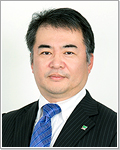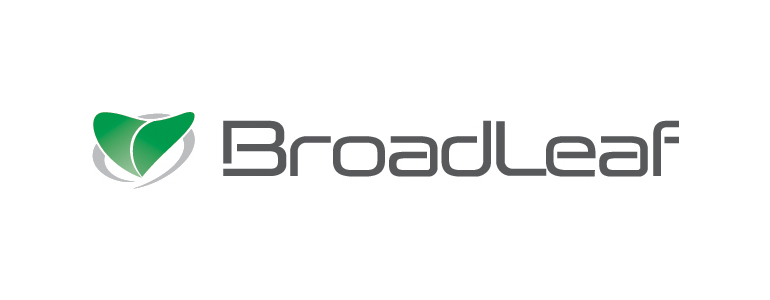| Broadleaf (3673) |
|
||||||||
Company Name |
Broadleaf Co., Ltd. |
||
Securities Code |
3673 |
||
Market |
TSE 1st Section |
||
Business Type |
Information/Communications |
||
President and CEO |
Kenji Oyama |
||
Head Office Location |
4-13-14, Higashi-Shinagawa, Shinagawa-ku, Tokyo |
||
Fiscal Year End |
End of December |
||
HP |
|||
*Share price is the closing price for August 18. Shares issued excludes treasury shares from shares issued at the end of the most recent quarter.
ROE and BPS use the results from the end of the last fiscal year. |
||||||||||||||||||||||||
|
|
* Estimates provided by Broadleaf.
IFRS has been adopted from the securities report for the term ended Dec. 2016. In the above table, IFRS is used from the term ended Dec. 2015 and the Japanese standards are used till the term ended Dec. 2014. Ordinary income corresponds to pretax income. The company conducted 2-for-1 share split on Dec. 17, 2016. EPS and DPS have been adjusted retrospectively. This Bridge Report presents Broadleaf's earnings results for the Second Quarter of fiscal year ending December 2017 and so on. |
| Key Points |
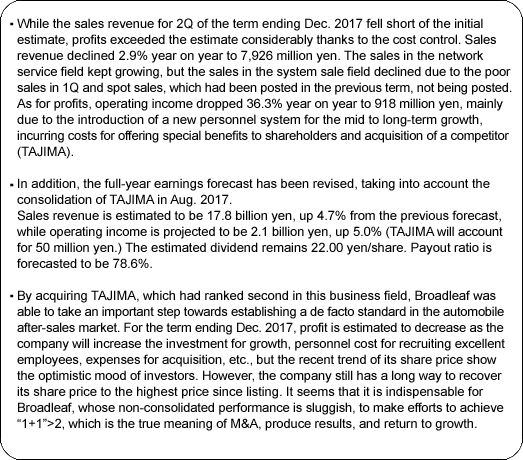 |
| Company Overview |
|
[Company History]
The company is the formal surviving company of a merger and, with support by American private equity fund the Carlyle Group, was established in September 2009 with the name CB Holdings Co., Ltd. as the receiving company for a management buy-out (MBO) by management of the effective surviving company, the former Broadleaf Co., Ltd.CB Holdings Co., Ltd. then made the former Broadleaf Co., Ltd. a wholly-owned subsidiary through stock transfer in November of the same year. On January 1, 2010, the former Broadleaf Co., Ltd. was absorbed with its entire business activities succeeded, the company name was changed to Broadleaf Co., Ltd. With the global financial crisis triggered by the bankruptcy of Lehman Brothers in 2008, the MBO was carried out to respond to the sudden change in the automobile industry climate and to build a sustainable growth base and expand overseas, without worrying about short-term fluctuations in business results. The chart below shows the history of the company since establishment. 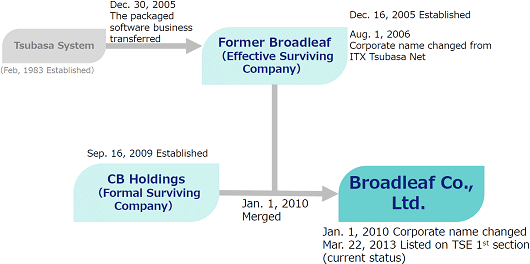 [Corporate Philosophy]
The company has a corporate philosophy of "joy and gratitude."
We work with our customers to develop successful businesses, based on the spirit of "joy and gratitude". We believe that is an essential part of forming close relationships between people and companies. When you see how our products and services contribute to your business, we hope that you will be happy that you chose Broadleaf.
(From the company website)
We hope you will also rejoice as you see your business grow day by day. Those positive feelings give us joy and gratitude, too, and inspire us to create even better products and services. Our aim is to grow hand in hand with our customers, based on this shared sense of joy and gratitude. That is our corporate philosophy and the guiding principle behind our business here at Broadleaf. All employees carry a credo* card with them at all times, and everyone recites the code of conduct at daily morning meetings. Employees who understand and exemplify the corporate philosophy are also awarded based on employee voting, creating a system for employees to indicate their gratitude to each other as well. *Credo: A term originating from Latin, referring to the company's beliefs and policies in brief. Many companies use it as a tool to encourage spontaneous action by employees. Creed. Broadleaf trees are supported by the earth, which enables them to give nutrients back and enrich the earth through their leaves. In much the same way, we are able to contribute to industry thanks to the support we have received from countless customers across various different sectors.
(From the company website)
Having accumulated information thanks to our customers' support, our aim here at Broadleaf is to feed that information back into industry, to make our customers happy. That's the sort of cycle we want to create as a company, so that we can repay our customers. That is why we named the company Broadleaf. [Market Environment]
-Overview
The target market of the company is the automotive aftermarket, with a market size of approximately ¥10 trillion. The "automotive aftermarket" covers all products and services after a vehicle has been purchased, including gasoline, automotive accessories, maintenance checks, safety inspections, spare parts, resale and disposal. (From the company website)
 1) Number of Automobiles Owned
The number of automobiles owned including light vehicles was 60.83million at the end of March 2016, and is continuing to grow. With the average years of car usage increasing, the stock of automobiles is expected to continue to grow.
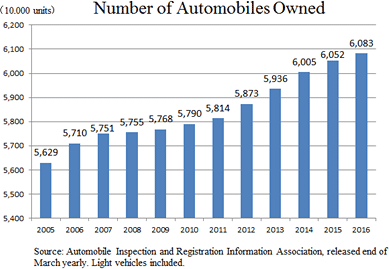 2) Average Number of Years Cars Are Used
The average number of years from when a passenger car is first registered to when its registration is removed was 12.76 years at the end of March 2016, an increase of over 2 years from 10.40 years at the end of March 2001.With the change in automobile users' opinions, long-term use of cars is increasing, which means demand for repairs/inspections and for replacement/consumable parts is increasing in the automobile repair market and parts market. 3) Number of Certified Workshops and Designated Workshops
"Certified Workshops" are workshops certified by the District Transport Bureau Chief, and can conduct automobile repair and modifications that require removing the motor, drivetrain or running gear in "dismantling maintenance."Of certified workshops, those that meet certain standards for facilities, skills, and organization, and are designated for automobile maintenance by the District Transport Bureau Chief are referred to as "Designated Workshops." The number of certified and designated workshops tends to remain the same or increase slightly, but in recent years the ratio of certified workshops that are designated has been increasing. This is probably because small workshops being absorbed into medium or large workshops and groups, due to issues such as economic trend and a lack of successors to take over. According to Broadleaf, there are approximately 70,000 workshops not associated with dealers in Japan, and of those 40,000 are small workshops with three or fewer mechanics, and the other 30,000 are medium- and large-scale workshops that Broadleaf is targeting, as workshops polarize to one extreme or the other. The number of medium- and large-scale workshops that have sufficient financial resources to use Broadleaf's system for parts orders is still only 2,097 at the end of June 2017, so there is still a lot of room for expansion. 4) Recycled Parts Market
The Automobile Recycling Law went into effect in 2005, and markets for automobile dismantling and recycled parts have gradually been developed. With the diversification of group shared recycle inventory systems and expanded use of internet auctions, the recycled parts market is expanding.Recycled parts use helps limit CO2 emissions and may have positive effects on the environment, and is expected to continue to expand due to its social importance. Also, automobile insurance fees being updated in October 2012 should give a boost to the recycled market. As seen above, the market environment facing the company is mostly positive. [Business Outline]
In addition to providing network work applications specialized for customer industries, maintenance service and supply products to mainly the automotive aftermarket industry, Broadleaf also carries out network services for its industry platform, consisting of the following three fields: 1) Business AP Software, 2) System Support and 3) Network Service.Since it is a single segment of the IT service business, the divisions shown below are carried out. 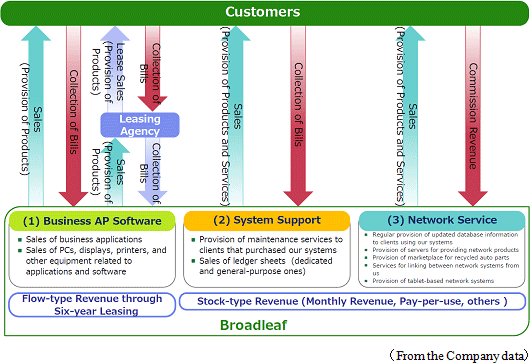 The sales composition for December 2016 had Business AP Software account for the majority with 65.2%, but attempts are being made to increase the share of recurring fee revenues. (Composition of Sales Sectors) [Business AP Software] -Development and sales of specialized business applications -Development and sales of information security and other packaged software -Acquisition and sales of PCs, printers and other equipment [System Support] -Provision of maintenance services to clients that purchased Broadleaf's system -Acquisition and sales of ledger sheets and OA supplies, etc. [Network Service] -Provision of database services to clients that purchased Broadleaf's system -Provision of server services to clients that purchased Broadleaf's system -Provision of clearing house service for recycled auto parts. -Provision of electronic order functions for auto parts -Provision of tablet-based work support tools, etc. 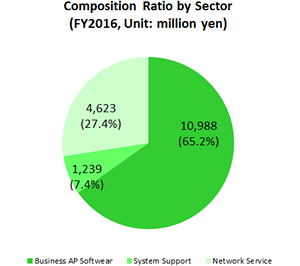 1) Business AP Software
Broadleaf conducts development and sales of specialized business applications used in industry platform for businesses in the automotive aftermarket industry as well as travel agencies, cellular phone dealers, and machine tool dealers.Broadleaf's specialized business applications improve usability by catering to specific industries for their unique business flows, as well as addressing general client needs such as estimate and invoice management. The company also carries out sales of computers with applications installed, as well as LCD monitors, tablets, printers, peripherals and other hardware. It also carries out system development under commission, in response to client needs. As for procedures for sales of systems, they were initially "one-off" sales, but from 2004 on, the process was changed to allow Broadleaf to sell system rights to a lease company, and then the lease company to sell it to customers with a 6-year lease contract. 2) System Support
To maintain an optimum business environment for customers, a support system has been made to respond rapidly to network, hardware and server problems, with a customer help desk open 365 days a year and specialized staff working in 35 locations (as of the end of December 2014) throughout Japan. This support system consists of "maintenance" section, which provides business application maintenance services and hardware maintenance services, and "supply" section, which conducts sales of ledger sheets and other supplies used by the business applications.
3) Network Service
A contingent service using Broadleaf's network for customers that purchased network specialized business applications.Network Service consists of "stock" section, with database and server services essential for the use of the business applications, and "transaction" section with the marketplace provided for distributing recycled parts in the automotive aftermarket industry and carrying out electronic transactions for auto parts between dealers. <Main Services in the Network Service Section>
-Parts Dealers and Maintenance Shops Platform Service with System Connections
Using the BL Parts Ordering System, the maintenance shops business system and parts dealer system are linked, to provide seamless service for estimate/delivery response and ordering.Until now, to order necessary parts maintenance shops would have to call or fax parts dealers they already had done business with. However, the procedure had more than enough trouble with regard to the inevitable hassle, incorrect orders, delivery time, etc. The BL Parts Ordering System improved this situation by greatly enhancing work efficiency, facilitating transactions, and enabling immediate responses for price/delivery dates. The System provides links between parts dealers seeking more maintenance shop clients and maintenance shops in need of necessary parts in time. Parts dealers pay a network usage fee, and maintenance shops are charged fees on a per-use basis. 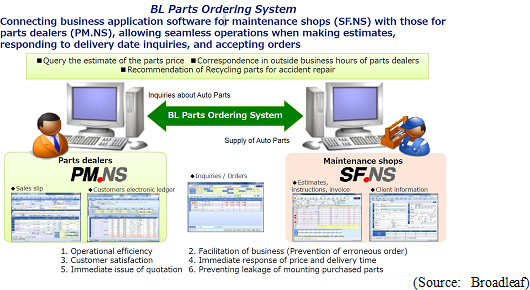 -Settling Payment for Recycled Parts Service
The company operates "Parts Station NET," which is a network for distributing recycled parts with shared inventory information of recycled parts.Recycling companies, which sell recycled parts, register their products in "Parts Station NET"; maintenance shops and sheet-metal factories, which use recycled parts, retrieve necessary products; and parts traders and recycling enterprises, which mediate transactions, check compatibility. At present, recycled parts worth about 240 billion yen per year are traded in Japan. Parts Station NET involves about 13,000 enterprises, and distributes about 10,000 parts per day, which accounts for about 17% (about 41.5 billion yen) of total sales in Japan. In the case where parts are traded between distributors and brokers, "Parts Station Factoring NET," an online payment settlement agent for recycled parts, collects commissions. For the term ended December 2016, it settled payment for recycled parts worth about 10 billion yen, and earned fee collection agency commissions amounting to about 660 million yen. 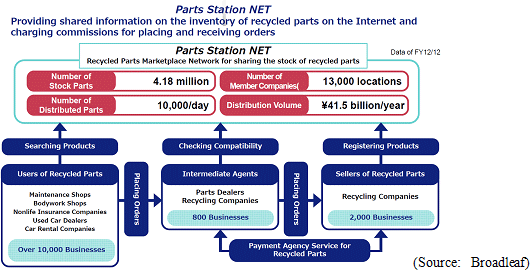 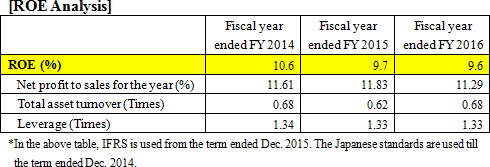 [Characteristics and Strengths]
1) The Only IT Company That Can Lead the Automotive Aftermarket
Based on the Declaration to be the World's Most Advanced IT Nation, adopted at a Cabinet Meeting on June 2013, the Ministry of Land, Infrastructure, Transport and Tourism created the Investigative Commission for Future Vision of Effective Use of Automobile-related Information to consider how to create new services and industry innovation by using automobile information held by the country, such as car registration information (including owner information), car location and car speed information, and accident and maintenance history.According to the Commission's Future Vision of Effective Use of Automobile-related Information announced in January 2015, current situation of use of automobile-related information in Japan is as follows:  Under such circumstances, Broadleaf believes that it is the only company that can lead the future automotive aftermarket, based on tens of thousands of its client companies and its expertise backed with its maintenance data on tens of millions of cars. *OBD: On-board diagnostics. Diagnostics performed by computers installed in automobiles to detect faults. 2) Overwhelming Share
Of the 2,200 parts dealers said to exist in Japan, around 1,500 or 70% already use Broadleaf's business system. For maintenance workshops, of the 30,000 non-dealer medium- and large-scale workshops that are the company's target, 13,000 use Broadleaf's system, demonstrating the overwhelming market share it has.In addition, there is no company other than Broadleaf that can provide a variety of systems using a platform. There do exist several distributors dealing in limited range of systems, but their sales amount to no more than one-tenth of Broadleaf's, so the company essentially has no competitors. 3) Ample Experience
Sales of the first automobile parts system, called Partsman, started in 1983. Partman was sold by Tsubasa Systems Co., Ltd., a company established in 1983, but Tsubasa transferred its packaged software business to Broadleaf in 1983, the same year. Therefore, if counted from then, Broadleaf can boast of over 30 years of experience. Ever since, the company has been making databases of parts information for the approximately 30,000 parts in a single automobile, and the parts codes created by their unique know-how have become the industry standard.With the vast amount of data collected, their database is overwhelmingly No. 1 in both quality and quantity.  4) Trusting Relationship with Clients
With a direct sales system to accurately determine client needs and carry out dedicated service, Broadleaf has formed relationships of deep trust with its clients, which is a valuable hidden asset of the company.Despite the 6-year term of the license contract with clients, the ratio of contract renewals is from 80% to 90%, with high customer satisfaction. |
| Second Quarter of Fiscal Year December 2017 Earnings Results |
 Sales and profit declined, but profit exceeded the estimate considerably.
Sales revenue was 7,926 million yen, down 2.9% year on year. In the network service field, sales grew, but could not offset the decline in sales in the system sales sector, which accounts for over 60% of total sales.Cost of sales declined and gross profit rate and gross profit increased. But they could not offset the augmentation in personnel expenses and stock-related costs. Consequently, operating income was 918 million yen, down 36.3% year on year. Sales revenue was slightly smaller than the initial estimate, but profit exceeded the estimate considerably thanks to cost control. 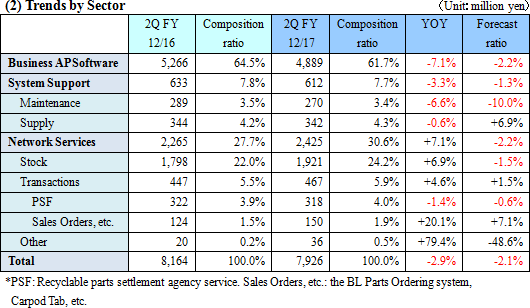 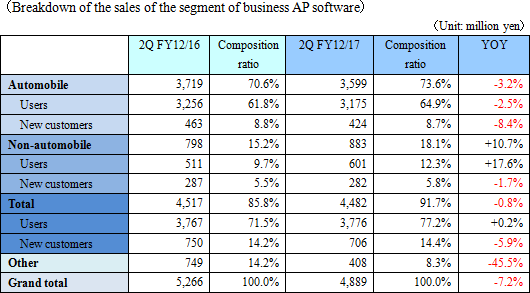 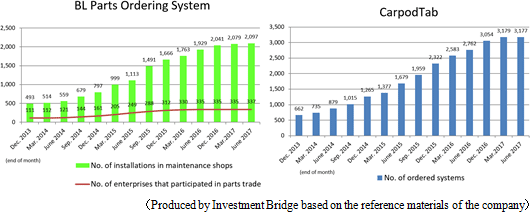 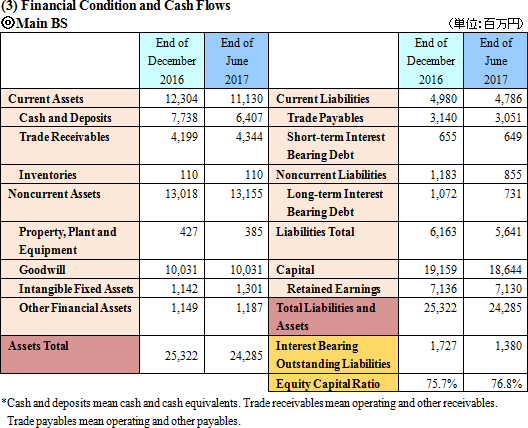 Total liabilities dropped 521 million yen from the end of the previous term to 5,641 million yen, due to the shrinkage of short and long-term interest-bearing debt, etc. Capital declined 515 million yen from the end of the previous term to 18,644 million yen, due to the increase of treasury shares, etc. As a result, equity capital ratio rose 1.1% from the end of the previous term to 76.8%. The interest-bearing outstanding liabilities decreased 347 million yen from the end of the previous term to 1,380 million yen.  The deficit of financing CF expanded due to the payment of dividends and the acquisition of treasury shares. The cash position degraded. (4) Topics
The company acquired all the shares of TAJIMA INCORPORATED (President Koichiro Takahashi; Shinjuku-ku, Tokyo), one of the leading companies in the same trade, on July 25, 2017. The acquisition cost is 1,670 million yen.◎ Acquired all the shares of TAJIMA INCORPORATED, one of the major companies in the same industry. (Overview of TAJIMA INCORPORATED) Under the slogan of "Wholehearted Support for the Future of Cars," TAJIMA INCORPORATED is the second largest company which provides services for maintenance shops in the automobile aftermarket business. While Broadleaf Co., Ltd. focuses mainly on medium to large-sized repair shops and auto parts dealers, TAJIMA INCORPORATED, with 35 sales bases and about 11,000 corporate clients throughout Japan, has the advantage of relationships with small to medium-sized corporate clients, and besides, its network system, the "Isshin Tasuke series," has been extremely famous in the industry. (Aim of the M&A) There is a growing tendency for business operators, including maintenance shops, gas stations, sheet metal plants, and car dealerships, in the automotive aftermarket business to forge stronger partnerships with car owners, particularly with respect to automobile safety inspection and maintenance. While the company estimates the number of such business operators at over 200,000 nationwide, the current number of users is about 20,000 and about 11,000 for Broadleaf and TAJIMA, respectively, (that is, 31,000 in total) leaving ample room for prospecting for new users. As mentioned above, the 2 companies have different target customer groups. Broadleaf believes that the acquisition of TAJIMA, the second largest company in the industry, has brought great benefit, including expansion of the automobile aftermarket business and enhancement of competitiveness, acceleration of standardization of the company's network service in the industry, sharing of knowledge and synergy effects, and optimization of various facilities and procurement activities, allowing it to implement its business strategies in the medium and long term with a sound corporate structure as a market leader. |
| Fiscal Year December 2017 Earnings Estimates |
 Sales are estimated to grow, but profit is forecasted to decline due to the enhancement of investment.
The full-year earnings forecast has been revised, considering the M&A of TAJIMA and other factors.Sales revenue is estimated to be 17.8 billion yen, up 6.2% year on year. The inclusion of TAJIMA in the scope of consolidation will increase sales by 1.3 billion yen, while the estimated non-consolidated sales of Broadleaf have been decreased by 500 million yen. Operating income is projected to drop 28.9% to 2.1 billion yen. The acquisition of TAJIMA will contribute to profit, but the company will actively conduct investment for recruiting and developing excellent personnel by introducing a new personnel system for mid to long-term growth, and incur the cost for acquiring TAJIMA and stock-related expenses as shareholders will increase. Accordingly, profit is forecasted to decline. The estimated dividend remains 22.00 yen/share. Payout ratio is forecasted to be 78.6%. 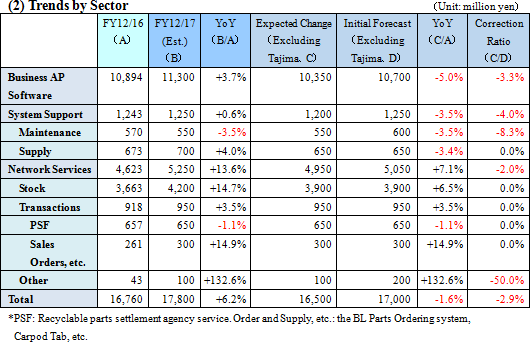 The sales of the former .NS series consisted of a 6-year licensing fee, which was charged in a lump as a lease contract fee, and a network usage fee on a monthly basis. If a user desires to add any options to upgrade functions during a period of the lease contract, the nature of the contract for the former .NS series requires the user to cancel the contract once. This is not user-friendly. In contrast, the new .NS series requires users to pay the basic rate for the lease contract, a monthly network usage fee which remains unchanged from the former series, and fees for adding options to upgrade functions that will be charged on a monthly basis. This makes it easier for users to use options and for the company to conduct upselling (recommend and sell higher-grade services to users), yielding benefit that will increase the sales per customer over a 6-year period. The company will continue sticking to the business style even after introducing the cloud model. In this term only, sales will be reduced by the amount of the sales of conventional options. Accordingly, the company revised downward its projections of sales by about 150 million yen for the second half. The number of licenses for the new series keeps growing steadily, with about 40,000 licenses as of the end of the previous term and about 42,000 licenses as of the end of the first half of this term. The company is considering disclosing the number of licenses regularly. |
| Future Outlook and Policies |
|
◎ Group structure
The target customer groups differ for the company and TAJIMA INCORPORATED as above mentioned, and therefore, the company successfully expanded the market coverage of its existing business in Japan thanks to the M&A.With this as a starting point, the company will further strengthen the structure of its corporate group, including 3 companies in Japan and 4 companies overseas, aiming to develop new markets both in and outside of Japan. ◎ Goals for this term
The company has set a goal for the next term ending Dec. 2018 as "a sales revenue of 19 billion yen and an operating income of 3.2 billion yen (operating income rate of 16.8%)."The sales revenue is achievable; however, the profit goal is currently under review as it needs to be thoroughly examined from the perspectives of both an increase in cost and cost cutbacks. The company plans to make an announcement at the end of this term. ◎ Key factors for group management
The company will endeavor to further expand its customer base through the comprehensive capability of its corporate group and introduction of a next-generation system overwhelming others. In addition, it will establish a management structure of its corporate group in anticipation of adoption of a new billing system.The key factors for management strategies of the corporate group for 2018 and subsequent years are as follows:  |
| Conclusions |
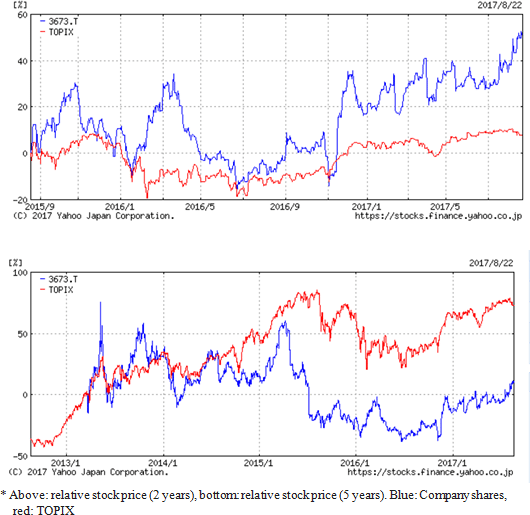 |
| <Reference: Regarding Corporate Governance> |
 ◎ Corporate Governance Report
Updated on Mar. 31, 2017 "As of March 31, 2017, we have implemented all the principles of corporate governance code." 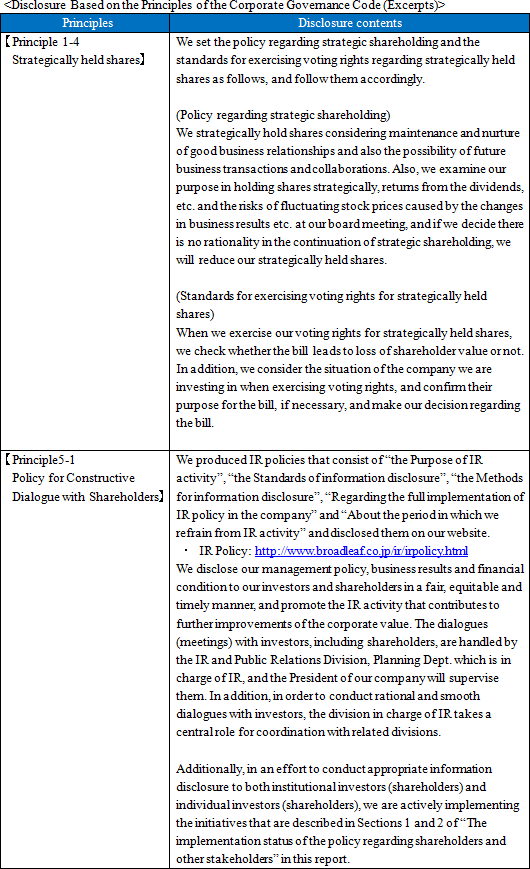 Disclaimer
This report is intended solely for information purposes, and is not intended as a solicitation for investment. The information and opinions contained within this report are made by our company based on data made publicly available, and the information within this report comes from sources that we judge to be reliable. However we cannot wholly guarantee the accuracy or completeness of the data. This report is not a guarantee of the accuracy, completeness or validity of said information and opinions, nor do we bear any responsibility for the same. All rights pertaining to this report belong to Investment Bridge Co., Ltd., which may change the contents thereof at any time without prior notice. All investment decisions are the responsibility of the individual and should be made only after proper consideration.Copyright(C) 2018 Investment Bridge Co., Ltd. All Rights Reserved. |

